This piece has been corrected to reflect the fact that Russia only attempted to issue Red Notices against Bill Browder eight times. An erroneous claim that Russia accounts for 33 percent of all Red Notices was also removed, along with one that stated INTERPOL’s data processing policy for refugees is new. An INTERPOL spokesperson reached out to JURIST disputing Ben Keith’s quoted assertion in a CBS interview that INTERPOL’s constitution “says that they are meant to believe their member states.” The actual text of that constitution indeed says no such thing, but CBS has said that “Keith stands by his interpretation.”
The International Criminal Police Organization, better known as INTERPOL , aims to foster global law enforcement collaboration. With a mission to “connect police for a safer world,” it operates as a vital hub, facilitating the exchange of crucial information among police forces worldwide. At the heart of its operations lies a sophisticated alert system, known as notices , which color-codes and disseminates intelligence on potential threats, crimes, and criminals across member countries. Among these notices, the “Red Notice” is the most well-known, signifying pursuit for individuals of grave concern. However, recent years have cast a shadow over the Red Notice system, with mounting concerns about its exploitation by authoritarian regimes seeking to target individuals for political motives rather than genuine criminal pursuits.
In this explainer, we explore Red Notices and the controversy they court.
What is a Red Notice?
A Red Notice is an alert from a member country that they are pursuing the location, arrest and possible extradition of a specific individual. Contrary to popular belief, while they are based on national arrest warrants they are not an international arrest warrant. Rather, they are used by forces to identify fugitives wanted for the most serious of offences such as murder, terrorism, human trafficking and organised crime. They serve as an alert when that particular fugitive passes through immigration control and often result in their arrest and the start of extradition proceedings. The issuance of a Red Notice therefore makes international travel almost impossible for the individual concerned. As of February 2024, there were 6,815 public Red Notices available to see online.
Before issuing a Red Notice, INTERPOL’s Notices and Diffusions Task Force must review the request. The task force consists of a team of legal professionals who look at relevant information to ascertain whether the notice complies with the INTERPOL Constitution and rules. They consider a number of factors, including the status of the person, the circumstances of the charges and case and whether the notice was issued amid domestic or international unrest in the member state. Despite the apparent systematic processing and oversight, the review system has been faulted for its lack of comprehensive scrutiny and Red Notices have come under criticism for their apparent exploitation by repressive regimes.
How are Red Notices considered controversial at times?
INTERPOL undoubtedly does a lot of good, including, among countless other successes, the arrests of Radovan Karadžić, French serial killer Charles Sobhraj and the second most wanted man in Italy, Rocco Morabito, after he had been a fugitive for over 20 years. They also count the rescue of 50 children in Thailand and the recovery of stolen artefacts as more recent achievements. However, the abuse of the Red Notice system has become a point of concern over recent years, with authoritarian regimes using them to target dissidents, political opponents and high net-worth individuals.
One of the most high-profile cases was Bill Browder, an American-born financier who at one time was the CEO and co-founder of the largest foreign portfolio investor in Russia. This was until he and his lawyer, Sergei Magnitsky, uncovered corruption at the heart of Russia’s government. Following this, Magnitsky was arrested and tragically died in the Russian penal system. Russian officials levied charges against Browder and attempted to issue eight Red Notices against him, to try and bring him into custody.
Allegations of abuse of the Red Notice system also include China’s targeting of Uyghurs and the United Arab Emirates’ misuse of the system to pursue those who are seen as a threat to the regime. The election of Ahmed Naser Al-Raisi, an Emirati general who had been accused of torture, to the president of Interpol was met with controversy .
In a recent interview with CBS 60 Minutes, Ben Keith and Rhys Davies, UK barristers who specialise in the removal of Red Notices, said of INTERPOL:
“Their constitution says that they are meant to believe their member states. And so when a member state, Russia, China, Turkey, whose rule of law is often nonexistent, say to them a particular person is wanted for a criminal offence, they are bound by their constitution to believe them.”
The consequences for those affected by bogus Red Notices can be devastating, with individuals’ freedom of movement and livelihoods severely restricted, not to mention the psychological impact of being labelled a serious criminal and the constant fear of being extradited. They cannot appeal to any international or national court.
As Ben Keith notes:
“We’re concerned about the rule of law and human rights, and Interpol are concerned about trying to catch people who are allegedly criminals. A lot of innocent people get caught up in the middle. It feels a bit like that’s the sort of price they’re prepared to pay for catching the bad guys. And we think that the price that is paid is far too high.”
What has INTERPOL said on the matter?
Secretary General of INTERPOL, Jürgen Stock, is aware of the shortcomings of the Red Notice system and said “I’m not saying that the system is perfect. We see wrong decisions on a national level. And we have seen wrong decisions also in Interpol. That is correct, a small number of cases.”
At last year’s General Assembly in Vienna, INTERPOL celebrated its centenary. The organisation has pledged to further increase scrutiny of Red Notice requests and, in 2022, around 1,500 notices were rejected.
Germany surrenders unconditionally, ending WWII in Europe
On May 7, 1945, General Gustav Jodl, on behalf of Germany, signed an unconditional surrender, effectively ending World War II in Europe. The surrender was formally accepted by the Allied Powers the next day, May 8, which came to be known as Victory in Europe (VE) Day. Read World War II legal documents, treaties, and declarations from the Avalon Project at the Yale University School of Law.
27th Amendment to US Constitution ratified
On May 7, 1992, the Twenty-seventh Amendment to the US Constitution was ratified, barring Congress from granting its members pay raises in the middle of terms. The Amendment had initially been proposed in 1789 by James Madison, but only became law after a grass-roots campaign in the 1980s against "excessive" Congressional privileges. Learn more about the Twenty-seventh Amendment.

On this page
Toolkit: interpol red notices and diffusions.
This information guide covers basic information about INTERPOL Red Notices and Diffusions. It offers straightforward practical answers to some of the questions we are most frequently asked by people who think they may be, or have been arrested because they are subject to an INTERPOL Red Notice or Diffusion.
INTERPOL’s legal framework is complicated, and somewhat unclear. In addition, what happens to you will differ according to the country in which you find yourself, as different countries respond differently to requests received through INTERPOL’s channels. Because of this, and because every case is different, we cannot guarantee that the information in this guide is applicable to your own case.
Getting specialised legal advice from a suitably qualified lawyer is extremely important. This guide only provides general information. If you need advice in relation to your specific case, or if you are concerned about a possible violation of your rights, you should discuss this with your lawyer.
This guide was last updated in December 2021. The information contained in this document is provided for information purposes only and is not intended as legal advice, nor does it constitute legal advice. Whilst we endeavour to keep the information up to date and correct, Fair Trials makes no representations or warranties of any kind, express or implied about the completeness, accuracy, reliability, suitability or applicability to individual cases of the information contained in this document. Any reliance you place on such material is therefore strictly at your own risk. Fair Trials disclaims any liability to the fullest extent permissible by law for any loss or damage of any kind arising from the use of the information provided. You should always seek professional legal advice from a lawyer qualified to practice in the jurisdiction you are in.
Interpol, Red Notices and Diffusions
What is interpol.
INTERPOL is an international body which helps police forces in different countries cooperate. INTERPOL is not a police force in its own right. It does not, for example, have powers to arrest people or to investigate crimes.
One of the ways in which INTERPOL helps police forces to cooperate is though its databases and communications channels. Information about wanted persons (individuals being sought for prosecution for a crime, or to serve a prison sentence) can be circulated in the form of Red Notices and Diffusions.
What is a National Central Bureau?
A National Central Bureau (‘NCB’) is a division of the police in a given country which exchanges information with INTERPOL. Typically, this will be a section of the police responsible for international cooperation. These NCBs are often called ‘INTERPOL’ – for example, the United Kingdom’s NCB is called ‘INTERPOL Manchester’ and China’s INTERPOL is called ‘INTERPOL China’ – even though they are independent of the organisation.
What is a Red Notice?
A Red Notice is an electronic alert circulated by INTERPOL at the request of an NCB. It is stored on INTERPOL’s databases and can be seen by police and immigration authorities all over the world. The function of a Red Notice is to ‘seek the location of a wanted person and his/her detention, arrest or restriction of movement for the purpose of extradition, surrender or similar lawful action’.
A Red Notice informs authorities in one country that those of another country are seeking the arrest of a particular person. A Red Notice contains information concerning the wanted person including name, date of birth, nationality, and a photograph. It also includes a description of the accusation for which the person is ‘wanted’, and a description of the acts which they are alleged to have committed.
What is a Diffusion?
A Diffusion is also an alert circulated through INTERPOL’s systems. Like Red Notices, Diffusions can be used to notify law enforcement authorities in one country that those of another country are seeking the arrest of a specific person. Although Diffusions are meant to be less formal than Red Notices, they can have exactly the same effect.
If I am subject to a Red Notice / Diffusion, can I travel?
If there is a Red Notice or Diffusion against you, there is a risk that you will be arrested, both at home and when travelling. In many countries, border agents are required to arrest people who are subject to a Red Notice, so you could, for example, be arrested on arrival or departure at an airport. Equally, in some countries hotels will forward information about guests to the local police, who check the names against INTERPOL lists, which could also lead to your arrest.
Finding out if there is a Red Notice or Diffusion against you
I think i may be subject to a red notice/diffusion. how do i find out.
It is not always easy to find out whether or not you are subject to a Red Notice/Diffusion. There are three main ways of doing this:
INTERPOL’s website
You can check the ‘ wanted persons’ section of INTERPOL’s website .
This page contains extracts of some, but not all, Red Notices. If your name does appear on this page, it will also include a very broad indication of what sort of offence you are wanted for, for example ‘theft’. To obtain more specific information, you will have to follow one of the other procedures described below.
Even if you are not listed on this page, you could still be subject to a Red Notice because only some Red Notices feature on this page. The rest are available only on INTERPOL’s restricted networks which are visible only to national law enforcement authorities.
Diffusions are never displayed on INTERPOL’s website, so if you are subject to a Diffusion you will not be listed on this page.
Some people Fair Trials has spoken to have been able to obtain information by simply asking police in the country where they live. There may not be a formal procedure provided for this, but in some cases, people have obtained answers on an informal basis.
However, you should be aware that the police may not be allowed to consult INTERPOL records and disclose information to you. Even if the police tell you that there is no information about you on file, this is not conclusive, as they may not have access to the relevant INTERPOL database.
You may also be able to make a request using ‘data protection’ laws in your country. In the European Union, for instance, countries are required to have procedures allowing a person to gain access to information about them held on government files. However, these laws usually provide exceptions for law enforcement authorities, and these could restrict your access to the information. You should consult with a lawyer in your country about this.
The Commission for the Control of INTERPOL’s Files (‘CCF’)
You can make a request to the Requests Chamber of the Commission for the Control of INTERPOL’s Files (‘CCF’) asking for access to your file. The CCF is a body that is responsible for ensuring that data processing at INTERPOL complies with its own rules. The CCF is comprised of two chambers – the Special Advisory Chamber and the Requests Chamber. The Requests Chamber is responsible for handling requests for access, changes to, or the deletion of information held on INTERPOL’s databases. It consists of five members, all of whom are lawyers. One lawyer must have recognised international experience in police matters and one must hold or have held a senior judicial or prosecutorial position. The other three must have expertise in data protection, international criminal law and human rights.
Any request you make to the CCF needs to meet the ‘admissibility requirements’ (see below).
The address to write to is:
The Commission for the Control of INTERPOL’s Files (CCF)
200 Quai Charles de Gaulle
Note that it is important to specify the Requests Chamber of the CCF as the addressee on your envelope. Mail addressed to INTERPOL (which has the same address) could be opened by INTERPOL’s General Secretariat, and there is a risk that the information you provide will be used for police cooperation. In other words, it could be recorded on databases and may become available for NCBs to see.
What are the CCF’s ‘admissibility requirements’?
The CCF will only consider your request if it is considered to be ‘admissible’ (in other words, it will only be considered if the request is made in a particular way). You can find out more about the CCF’s admissibility requirement on INTERPOL’s website .
There are certain specific requirements which your request must comply with in order for the CCF to consider it:
- It needs to contain your signature in its original form (copies of your signature are not accepted);
- It must be written in one of the CCF’s four working languages (Arabic, English, French or Spanish);
- It must state the purpose (such as, a request for access to INTERPOL’s files, or a request for correction or deletion of data);
- It must be accompanied by a copy of an official identity document, which includes all of your essential identification details (full name, date of birth, photograph). The information must be clear, readable and not crossed out. Examples of suitable documents for adults might include a passport, national identity card, travel document, or a driving licence; and
- You must complete and attach the Application Form ( available from this link ).
What information should I include in the request to the CCF?
You may wish to clarify when you make your application to access your personal information on INTERPOL’s files that you are making the request under Article 18 of the Rules on the Processing of Data and Article 29 of the Statute of the Commission for the Control of INTERPOL’s Files. These provisions entitle you to make the application. You do not have to ‘justify’ or explain your interest in obtaining access to your information.
Fair Trials suggests including a brief explanation of why you think you may be subject to a Red Notice or Diffusion. You should also provide a copy of any document that shows INTERPOL may have information about you.
If you are facing extradition, you are detained, or there are other good reasons why the CCF should treat your request as a matter of urgency, this should be highlighted in your request.
Will the CCF share any information I provide with the police force of the country that is looking for me?
As a general rule, the information you provide to the CCF is treated as confidential, but if you do not want any information to be disclosed to the NCB that is looking for you, you should make this clear when you write to the CCF.
The CCF needs to share at least some information about you with the NCB – otherwise it is unable to act on your request. The minimum information that the CCF needs is the following:
- Your Date of Birth; and
- The fact that you are making a request for access to information being held on INTERPOL’s files.
Understandably, many individuals have concerns that if the CCF shares this information with the relevant authorities, this will draw unwanted attention to themselves.
Will I receive an acknowledgment? When will this happen?
If your request complies with the admissibility requirements, the CCF will send you an initial response which will read something like this:
‘We acknowledge receipt of your correspondence dated [date] to the Commission for the Control of INTERPOL’s Files.
Insofar as you have provided the required documents, your request is admissible.
We will keep you informed of further developments in due course.’
The CCF will be your point of contact throughout the application process. The CCF’s rules require the CCF to acknowledge your request as soon as possible. Once the Requests Chamber receives your request, it will let you know within one month whether it is admissible.
Is the CCF obliged to grant me access to INTERPOL’s files?
You are able to access this information, subject to certain restrictions. According to INTERPOL, information on INTERPOL’s files ‘belongs’ to the NCB that provides that information to INTERPOL. The NCB could ask CCF not to disclose any information at all, or to refuse to confirm whether or not there is any information on file. However, the NCB cannot ask the CCF to withhold information from you unless there are good reasons for doing so, which are the following:
- To protect public or national security or to prevent crime;
- To protect the confidentiality of an investigation or prosecution;
- To protect the rights and freedoms of the applicant or third parties;
- To enable the Commission or the Organization to properly discharge their duties.
The failure to give good reasons for withholding information does not, however, mean that this information will be disclosed to you without the NCB’s consent, and it also does not mean that the information will be deleted.
When can I expect a full response?
The CCF has four months from the date it declared your request admissible to reach a decision. Once it has made its decision, the CCF has one month to notify you of the outcome.
Asking for the removal of information from INTERPOL’s files
I know that there is information about me on interpol’s files. how do i get it deleted.
INTERPOL states that there are three courses of action you can take to try to get your name removed from INTERPOL’s files.
- Firstly, you can ask the authorities in the country which issued the Red Notice to remove the information. Each country has its own laws and procedures and you will need to take local legal advice in the relevant country to explore this step.
- Secondly, you can ask the authorities in the country where you live to ask INTERPOL to remove your name from its databases. This is not done very often, and you may need the help of a local lawyer to find out if this is a realistic option for you. #
- Finally, you can write to the CCF and ask it to recommend the deletion of your information. Your letter will need to comply with the admissibility requirements described above.
I am thinking of writing to the CCF to request the deletion of my Red Notice/Diffusion. Should I make an access request first, before asking for the information to be deleted?
Although this is likely to increase the overall length of the process, it may be helpful to make a request for access first. This is because the CCF may disclose information to you, and this could help you understand what is alleged against you and enable you to provide more relevant comments and arguments when challenging the information.
If you are a recognised refugee, you might want to mention this and provide proof of your status when you make the access request.
Should I write to the CCF myself or brief a lawyer to do it?
INTERPOL’s rules are complex and the best course is to contact a lawyer with experience of challenging INTERPOL Red Notices and Diffusions.
INTERPOL does not provide legal aid and we are not aware of any country providing legal aid to enable a person to challenge a Red Notice or Diffusion. If you are unable to pay for legal help, you may have to make a request yourself.
Which rules will the CCF apply when determining whether or not information on INTERPOL’s files should be removed?
The following are some of the key rules on which you may wish to rely when requesting the deletion of information:
- Article 3 of INTERPOL’s Constitution, which states that it is ‘strictly forbidden’ for INTERPOL to engage in any activities of a political, religious, military or racial character;
- Article 2 of INTERPOL’s Constitution, which requires the organisation to act ‘within the spirit of the Universal Declaration of Human Rights’;
- The Rules on the Process of Data (‘RPD’) (available on INTERPOL’s website), which includes detailed provisions on Red Notices and Diffusions. This is the main rulebook that the CCF applies; and
- The special policy that applies to individuals who have been recognised as refugees under the 1951 Convention relating to the Status of Refugees.
What kinds of arguments could I make under Article 3?
INTERPOL has published a ‘Repository of Practice’, which explains how it interprets Article 3, and gives examples of the circumstances in which a Red Notice or a Diffusion might be viewed as political in character. This information is accessible online here .
Fair Trials understands that INTERPOL weighs up the ‘political’ aspects of a case against the ‘ordinary-law’ (criminal) aspects to see which ‘predominates’, when determining whether or not a Red Notice complies with Article 3 of its constitution.
You should therefore draw attention to political aspects of your case. We suggest that you organise this information in your letter according to these headings, which are based on INTERPOL’s rules:
The nature of the offence, namely the accusations and underlying facts
In this section, you should talk about the offence that you are said to have committed and explain in what way it can be considered political. For instance, if you are accused of organising a riot, but in fact you were leading a peaceful protest about a political cause, you should explain this. If you have evidence (video footage, eye witness statements, newspaper reports), then include this.
The status of the person concerned
In this section, you should explain who you are, focusing on your political status. If you are a political figure, you should explain this and provide evidence (for instance, a letter from political parties confirming your membership).
If you have a bad relationship with the country that has obtained a Red Notice against you, then explain this. For example, if you have been involved in a campaign which has troubled the authorities, then set out the details of this, and make sure to include evidence (such as newspaper reports) to confirm this.
If you have been recognised as a refugee there is a special policy that could apply to you (see below).
The identity of the source of the data
In this section, you should explain why you think the country may be pursuing you for political reasons. For instance, if you think it is because the country often represses people from a political movement you are part of, explain this. If possible, provide evidence (for instance, reports by bodies like Human Rights Watch, Amnesty International, United Nations bodies, or local human rights organisations).
The general context of the case
In this section, you should provide all other information regarding the political aspects of the case. In particular, if the country seeking your arrest has asked for you to be extradited in the past and this was refused because it was considered to be a political request, you should say so and provide evidence (a copy of the judgment).
If the criminal case against you is well-known and has been discussed in the media, or if human rights organisations have said that they are concerned about the case against you being political, you should provide this evidence.
What kinds of arguments could I make under Article 2?
Article 2 requires INTERPOL to take into account human rights in relation to the circulation of a Red Notice/Diffusion. It is not very clear how this rule is understood, but you might find it helpful to consult examples of previous decisions that the CCF has made, which are published on its website here .
You might wish to cover the following issues:
Matters of a political character
If you believe that the criminal charges against you stem from political motivations because of your past or present political connections, it may not be enough to argue that these charges followed a regime change, or other political event, even if you have had no prior criminal record. In these cases, it could be helpful to provide evidence that other countries or international entities, including courts or other judicial authorities, have issued decisions that found evidence of political corruption in the country prosecuting you. These decisions could include the finding of rights violations with respect to a fair trial, that the country’s conduct violates international and regional human rights standards (for example, the European Convention on Human Rights).
Freedom of speech/assembly
If you are a journalist or political campaigner and the Red Notice/Diffusion is preventing you from speaking freely, for instance by preventing you from attending events, then say so. Try to provide evidence if you can (for instance, letters from governments denying you permission to enter because of the Red Notice/Diffusion).
Risk of torture
If you believe that you would be tortured if you were sent to the country concerned, then say so. Try to provide evidence if you can. For instance, there may be reports from international bodies or courts saying that people in the same category as you are at risk of torture (ethnic groups, political parties, etc.).
If you have been granted protection from return to your country because of a risk of this kind (such as ‘subsidiary protection’ in the EU, or protection under the Convention Against Torture in other countries such as the United States) then you should include evidence of this. If a long time has passed since this decision was made, explain why you think you are still at risk.
Other decisions that could be used as evidence to demonstrate the risk could include a decision made by the United Nations Committee against Torture that is specifically relevant to you, and a decision refusing your extradition on the basis that you are at risk of torture.
Evidence obtained by torture
If you think the evidence in the criminal case against you has been obtained by torture, then explain why. For example, if you know that someone was beaten and forced to give evidence against you then try to provide evidence if you can (such as newspaper stories or reports by human rights organisations talking about the use of torture).
Death penalty
If you have been sentenced to death or if you are accused of an offence for which you could be sentenced to death, the Red Notice/Diffusion could still be valid if you are an adult. However, if you were a minor (that is, under 18 years of age) at the time of the facts, then be sure to point this out.
What are some of the key rules in the RPD?
There are some key rules in the RPD on which you might want to rely for challenging a Red Notice or Diffusion. These include:
Not of interest for the purposes of international police cooperation (Article 76(2)(b) and Article 99(2)(c))
Fair Trials believes that this rule means that a Red Notice cannot remain in place if it makes a request with which no other country could cooperate. For instance, if you have been granted protection (as a refugee, or for other reasons) and you believe no country would be allowed to send you back, then you should mention this.
Fair Trials also believes that a Red Notice is not of interest for the purpose of international police cooperation if it concerns a ‘bounced cheque’ offence – most countries do not see this as a criminal offence, and so would not be prepared to extradite you for it.
Not using Red Notice for its intended purpose (Article 82)
The purpose of a Red Notice is to ‘seek the location of a wanted person and his/her … arrest … for the purpose of extradition’. If the country which obtained the Red Notice against you has had a chance to seek your extradition but has not done so, then inform the CCF of this. If you think the country is using the Red Notice just to spoil your reputation or to stop you travelling, then explain why you think this.
Special conditions – Red Notices only (Article 83)
Red Notices may not be used for offences ‘that raise controversial issues relating to behavioural or cultural norms’ (like adultery), and offences ‘originating from a violation of laws or regulations of an administrative nature or deriving from private disputes’. For example, this might include the offence of ‘uttering an unfunded cheque’ in the United Arab Emirates.
Minimum sentence threshold – Red Notices only (Article 83)
Red Notices cannot be published or maintained unless they are sufficiently serious. This is decided by looking at the length of the sentence. There are two approaches:
- If you have already been convicted, a Red Notice may not be published to seek your return to serve the sentence unless that sentence is at least six months’ imprisonment.
- If you have not been convicted, a Red Notice may not be published to seek your return to face prosecution and trial unless the offence in question is punishable by at least two years imprisonment. In order to find out whether this is the case, you may have to contact a lawyer in the country concerned to ask what the ‘legal maximum’ sentence for the offence is. Otherwise, you can try searching for the criminal code for your country on the internet.
I have been recognised as a refugee. Will my Red Notice / Diffusion be removed on this basis?
INTERPOL has a policy for individuals recognised as refugees under the 1951 Convention relating to the Status of Refugees. INTERPOL has not published this policy in full, but it has provided information about this policy on its website here .
Under this policy, which was announced in 2015, Red Notices and Diffusions are not allowed if:
- The status of the refugee has been confirmed;
- The Red Notice/Diffusion has been requested by the country where the individual fears persecution; and
- The granting of refugee status is not based on political grounds vis-à-vis the country that requested the Red Notice/Diffusion.
This means that if you have been recognised as a refugee, and INTERPOL is able to verify your status with the country or the authority (such as the UN High Commissioner for Refugees) that determined your refugee status, the Red Notice/Diffusion relating to you should be removed. There is no requirement for the criminal accusations that form the basis of the Red Notice/Diffusion to be linked to your asylum claim.
This policy has been interpreted narrowly, and it has restricted its application to individuals who currently have refugee status. This means that if you were previously granted refugee status, and you subsequently acquired the citizenship of the country where you were recognised as a refugee, you will probably no longer come under this policy. However, this does not prevent you from using your previous refugee status as evidence that the Red Notice/Diffusion violates INTERPOL’s rules.
You should provide evidence of the fact that you have been granted refugee status, and that you continue to hold refugee status to the CCF. This may include a copy of the letter and/or an identity document (such as a refugee travel document) that confirms your refugee status.
I was subject to an extradition request which was refused. Will my Red Notice/Diffusion be removed on this basis?
Not necessarily, but evidence that an extradition request was refused may be helpful in demonstrating that a Red Notice/Diffusion does not comply with INTERPOL’s rules (especially if the extradition was refused for human rights or political motivation reasons). The relevance of the extradition refusal may depend on the reasons for the decision.
Instead of deletion, the CCF may recommend the inclusion of an ‘addendum’ reflecting the fact that your extradition has been refused (see below).
What else should I bear in mind when writing the letter?
Try to be as precise as possible, providing specific dates, names and places wherever possible. Avoid making general, bare statements about the country where you are being accused of the crime. Try to refer to the specific facts of your situation and explain why these demonstrate that what you think is correct. You should also include all other relevant information and evidence to support your application. Examples of this supplementary information include court decisions, pending legal action, work history, and the like.
You should also bear in mind that the CCF cannot decide whether someone is guilty or innocent. It might be difficult to persuade the CCF that your Red Notice or Diffusion should be deleted on the basis that there is weak or little evidence to support the criminal case against you.
Applications for the correction or deletion of Red Notices, Diffusions, and other types of information on INTERPOL’s databases must be 10 pages or less.
What will the CCF do with the information I send?
The CCF’s rules require it to protect the confidentiality of a request, but also recognise that it may have to share some information with INTERPOL, which could then potentially be shared with the relevant NCB.
If there is sensitive information – such as the fact that you have been granted asylum, or documents showing your association with people still in your home country – you should assume that there is some risk of this coming into the possession of the NCB as a result of the request. However, the information may be very important for the purposes of challenging the Red Notice/Diffusion, so you may feel you have to submit it.
There is no harm in explicitly asking the CCF to keep the information you submit confidential. Equally, if there are names of people in the documents which you feel uncomfortable submitting, you could remove these. Bear in mind however, that this may affect the document’s persuasiveness.
What action will the CCF take once it has read my request?
The CCF will examine the information you give and may, based on what you say, ask questions to the NCB that obtained the Red Notice against you or issued the Diffusion against you. It may also ask the NCB to provide a copy of the arrest warrant which it has issued against you.
Will the Red Notice/Diffusion continue exist while my challenge is ongoing?
The CCF has developed a practice whereby it will sometimes recommend to INTERPOL that it blocks access to a Red Notice/Diffusion while it considers a challenge. If it does this, other NCBs consulting INTERPOL’s systems will not be able to see it.
This may result in the disappearance of the public extract of a Red Notice on INTERPOL’s website while your challenge is being considered. However, if you see that the Red Notice/Diffusion has disappeared, you should not assume that it has been permanently deleted. Wait until you have a written answer from the CCF confirming this.
Will I know what questions the CCF asks the NCB?
Fair Trials is not aware of any cases in which the CCF informs individuals about the questions they ask the NCB whilst they are considering the request. However, you may find out what questions were asked once the CCF has made a decision on your case from their written decision.
How long does the NCB have to respond?
The CCF has the power to set deadlines within which it expects to hear back from the NCB, but we do not know specifically how long these usually are.
Will I know what the NCB says in response?
In our experience so far, this information is not disclosed, but this could change given that the CCF’s policies and procedures for examining complaints have changed. However, the CCF may come back to you with further questions. You might also be able to see what the NCB said in response in the final decision.
Will there be a hearing?
The CCF has the power to meet with individuals but will only meet with them in exceptional circumstances if it determines that a meeting is necessary. As far as we are aware, the current CCF has never used this facility. The CCF will base its decision on the information submitted to it in writing.
When can I expect an answer from the Requests Chamber?
The CCF meets at least three times a year and it is required to publish the timeframe of planned sessions for each year. However, the CCF can also take decisions on requests in between these sessions.
From the time the CCF declares a request admissible, it has nine months to make a decision on your request for the correction or deletion of data. In exceptional circumstances, the CCF will extend the time limit. In that case, it should communicate and explain this decision to you. You will receive a response at most two months after the CCF reaches its decision. The CCF will inform you in writing of the reasons for its decision, including its application of INTERPOL rules and its legal analysis.
What powers does the CCF have?
The CCF’s decisions are binding. It also has the power to consult international bodies and seek expert advice in its decision-making process.
What are the different possible outcomes?
The CCF will make one of three decisions.
- Firstly, it may decide that the information be deleted altogether.
- Secondly, it may decide that the Red Notice / Diffusion be marked with a ‘caveat’ or ‘addendum’ (see below).
- Thirdly, it may conclude that the information complies with INTERPOL’s rules and therefore decide no change is required.
What is an ‘addendum’ / ‘caveat’?
An ‘addendum’ or ‘caveat’ is an additional piece of information which is added to the file by INTERPOL. It includes relevant information such as the fact that your extradition has been refused.
The purpose of an addendum is to ensure that police in other countries are aware of the information, as this may influence their decision whether to arrest you or not.
Will I see the text of an ‘addendum’/‘caveat’?
It is unlikely that you will be able to see the entire text of an addendum, but we encourage you to ask to see it. Unlike the original Red Notice/Diffusion, it is not the property of the NCB so you can reasonably claim to be entitled to see it.
What can I do if the CCF refuses my request?
There is no appeal against a decision of the CCF. In addition, if you make another complaint, the CCF will only re-examine the case if you bring to its attention a new fact which, had it been known to the CCF when it was considering the first complaint, ‘would probably have led to different conclusion’. These applications must be made within six months after the discovery of the new facts.
The Red Notice/Diffusion has been deleted. What now?
The usual procedure is for all INTERPOL member countries to be informed of the fact that the Red Notice/Diffusion has been deleted, and to request that they delete all the information that they may have already downloaded. However, if you are not told specifically that this has been done, you should write back to the CCF asking it to confirm this.
The Red Notice/Diffusion has been deleted. Can I travel freely now?
Even if the Red Notice/Diffusion has been deleted, and even if all INTERPOL member countries have been informed of this, there are still potential risks for you.
This is because information from INTERPOL’s files may already have been downloaded and copied onto national police databases in countries around the world. Even if INTERPOL deletes its own information and requests INTERPOL member states to do the same, this does not mean the information will be deleted from local computers.
You could therefore still be arrested, for instance when crossing a border or when providing a passport when checking into a hotel.
It may be useful for you to take with you on any travels a copy of the letter confirming that the Red Notice/Diffusion has now been deleted. The CCF can sometimes issue letters confirming that there is no data relating to you on INTERPOL’s systems, which might be helpful to you, if you are concerned about potential difficulties caused by a removed Red Notice/Diffusion. If you do not get this from CCF automatically following the deletion of your data, you can request it from them.
You may also wish to make prior contact with a lawyer in the country to which you are travelling, either to have your name removed from the local police database, or simply to be ready in case you get arrested.
Related content
Eaw defence toolkit: a guide for criminal defence lawyers, faqs about interpol, toolkit: european arrest warrants.

An official website of the United States government
Here's how you know
Official websites use .gov A .gov website belongs to an official government organization in the United States.
Secure .gov websites use HTTPS A lock ( Lock Locked padlock ) or https:// means you’ve safely connected to the .gov website. Share sensitive information only on official, secure websites.
Watch Live at 11:30 a.m. ET: Results of Nationwide Law Enforcement Effort Press Conference
View the latest ICE guidance on COVID-19
ICE Check-in for Noncitizens
Get information about how to check in with your local ICE Office here .
Reportándose con ICE: Obtenga información sobre cómo reportarse a su oficina local de ICE aquí .
View in other languages

Call 1-866-DHS-2-ICE to report suspicious activity Report Crime
Related Information
Ice updates guidance for use of interpol red notices during law enforcement actions.
WASHINGTON – U.S. Immigration and Customs Enforcement (ICE) today announced new agency-wide guidance about the use of Red Notices and Wanted Person Diffusions, as part of its commitment to comply with the requirements of INTERPOL’s Constitution and Rules on the Processing of Data. ICE Directive 15006.1 codifies and strengthens the agency’s best practices and supports the U.S. Department of Homeland Security’s (DHS) broader efforts to combat transnational repression by helping ensure Red Notices and Wanted Person Diffusions are issued for legitimate law enforcement purposes and comply with governing rules.
Red Notices are issued for fugitives wanted either for prosecution or to serve a sentence. A Red Notice is a request to law enforcement worldwide to locate and provisionally arrest a person pending extradition, surrender, or similar legal action. Wanted Person Diffusions serve a similar purpose but are circulated directly by an INTERPOL member country to one, some, or all other INTERPOL member countries.
Generally, ICE Directive 15006.1 prohibits ICE personnel from relying exclusively on a Red Notice or Wanted Person Diffusion to justify law enforcement actions or during immigration proceedings. If ICE personnel intend to rely on a Red Notice or Wanted Person Diffusion to help inform whether an enforcement action should be taken or during immigration proceedings, they should do so sparingly and only after certain threshold criteria have been met, as outlined in the directive.
ICE Directive 15006.1 instructs personnel to:
- Complete mandatory training annually.
- Verify the validity of a Red Notice or Wanted Person Diffusion to ensure it has not been suspended, withdrawn, or expired.
- Conduct a preliminary review of available information for any indications of potential abuse or non-compliance with INTERPOL’s rules.
- Obtain supervisory approval to act upon a Red Notice or Wanted Person Diffusion.
- Request the associated underlying documentation via INTERPOL Washington.
- Request use authorization via INTERPOL Washington if ICE intends to use a Red Notice or Wanted Person Diffusion in immigration proceedings.
- Provide the wanted person with underlying documentation associated with the Red Notice or Wanted Person Diffusion, as applicable, and provide them with a meaningful opportunity to contest it or its contents.
- Not represent or imply that a Red Notice or Wanted Person Diffusion is an arrest warrant, nor that it conveys independent legal authority or represents an independent judgment by INTERPOL concerning probable cause or the validity of the underlying criminal proceedings.
ICE officers make case-by-case determinations under federal immigration law to determine if individuals are removable noncitizens. In some instances, the interest of another law enforcement agency – either here in the United States or abroad – may inform the analysis of whether an individual is a noncitizen, is removable under the immigration laws, or qualifies for immigration relief or release from custody.
- Information Library
- Contact ICE

- What is INTERPOL?
- General Secretariat
- Member countries
- Legal framework
- Our funding
- INTERPOL 100
- Commission for the Control of INTERPOL’s Files
- Counterfeit currency and security documents
- Cultural heritage crime
- Crimes against children
- Drug trafficking
- Environmental crime
- Financial crime
- Firearms trafficking
- Border management
- Capacity building
- Command and Coordination Centre
- Criminal intelligence analysis
- Fugitive investigative support
- I-CORE: our vision for change
- Government partners
- International organization partners
- Our partnerships with regional policing bodies
- INTERPOL Foundation for a Safer World
- Private sector partners
- General Assembly Exhibition
- How to become a partner
- Help us find
- If you need help
- Honouring the world’s police
- Wanted persons
View Red Notices
Home > page: wanted persons.

View and search public Red Notices for wanted persons
A Red Notice is a request to law enforcement worldwide to locate and provisionally arrest a person pending extradition, surrender, or similar legal action. A Red Notice is not an international arrest warrant.
The individuals are wanted by the requesting member country, or international tribunal. Member countries apply their own laws in deciding whether to arrest a person.
The majority of Red Notices are restricted to law enforcement use only.
Extracts of Red Notices are published at the request of the member country concerned and where the public’s help may be needed to locate an individual or if the individual may pose a threat to public safety.
The Notices appearing on this website contain information that is subject to INTERPOL’s rules and regulations, notably our Rules on the Processing of Data. The information provided in these notices may only be used for its designated purpose, namely to alert the public and/or seek information from the public in accordance with our rules. The information provided in this list and the individual notices cannot be used for any other purpose or any commercial purpose.
This list is regularly updated by the INTERPOL General Secretariat based on information provided by the countries that request the issuance of the notices and their publication on this website.
Filter criteria

TANGUMA JAMES ARTHURO
47 years old United States

SINGH KARANVIR
38 years old India

SALAZAR TOMAS ORLANDO
43 years old El Salvador

MAKANDRA ANDUELO KENNETH
33 years old Suriname

CHITASHVILI NODARI
39 years old Georgia


CARR THIERNO
32 years old United States

CARRILLO PORTILLO CECILIO ALBERTO
46 years old El Salvador

AMAYA CALDERON HERBERTH ALEXANDER
36 years old El Salvador

PECH MÉNDEZ JULIO MIQUIEL
29 years old Guatemala

SHIFAU HUSSAIN
37 years old Maldives

ARTENIE TUDOR-MARIAN
35 years old Romania

CALDERON SANCHEZ ELISA MARIBEL
58 years old El Salvador

SANCHEZ MORALES PEDRO
36 years old Bolivia

SILLERO BERNABE EFRAIN
27 years old Bolivia

39 years old Central African Republic

ARAUJO RUIZ CARLOS ERNESTO
61 years old Uruguay

HURTADO SUAREZ JUAN PEDRO
34 years old Bolivia

LEIVA RIVERA ESTEBAN
40 years old El Salvador

TOMKIEL SZYMON
39 years old Poland

PORTO MARQUEZ JUAN
44 years old Bolivia

Connect with us
Social media.
INTERPOL 2023. All Rights Reserved
INTERPOL Red Notices And Travel To The U.S.- Why A Redress Control Number May Be Needed After Notice Removal

Many Red Notice subjects are concerned about whether they may face issues when traveling, even after their Red Notices have been removed from INTERPOL databases. In some instances, although they are permitted to enter a country after a Red Notice has been removed, subjects have encountered issues at airports and either face delays or are denied permission to travel. For such people traveling to (or back to) the United States, a Redress Control Number may be appropriate.
What is Redress Control Number?
The Transportation Security Administration (TSA) provides a secure flight screening program through the Department of Homeland Security’s Traveler Redress Inquiry Program (DHS TRIP) . This program was created to assist and simplify the watch-list matching process to prevent further misidentification of travelers. People who continually face delays and questioning upon their entry to the United States due to an old criminal case or Red Notice can apply to this program for relief.
Why is a Redress Control Number useful?
If an individual’s redress number application is approved, TSA assigns a seven-digit number which will ease the screening process for travelers who may have been added to a security watch-list or incorrectly marked as high-risk. This number can be added to travel reservations during booking, on a traveler’s frequent flyer profile, or added by an airport agent at check-in.
In the next post, we will address how to know whether and when to apply for a Redress Control Number.
As always, thoughts and comments are welcomed.
[ View source .]
Related Posts
- Europe (Lyon, France): INTERPOL’s CCF To Hold Its Third Session Of The Year
- INTERPOL Red Notices and travel to the U.S.- deciding when and whether to apply for a Redress Control Number
- U.S.- Immigration agency updates guidelines for officials’ treatment of Red Notices (part 1 of 3)
- What isn't a Red Notice? Video
- Should I go to France to file a case with INTERPOL? Video
DISCLAIMER: Because of the generality of this update, the information provided herein may not be applicable in all situations and should not be acted upon without specific legal advice based on particular situations.
Refine your interests »
Written by:

Published In:
Estlund law, p.a. on:.

"My best business intelligence, in one easy email…"

You are using an outdated browser. Upgrade your browser today or install Google Chrome Frame to better experience this site.
Travel Health Notices
Search By Country Name or Disease
CDC uses Travel Health Notices (THNs) to inform travelers about global health risks during outbreaks, special events or gatherings, and natural disasters, and to provide advice about protective actions travelers can take to prevent infection or adverse health effects.
A THN can be posted for: 1) a disease outbreak (higher number of expected cases) in a country or region, 2) sporadic cases of a disease in an unusual or new geographic location, 3) natural and human-made disasters with severe environmental health risks, or infrastructure damage that would limit healthcare services availability and 4) mass gathering events that can lead to disease outbreaks. See types of travel notices .
Level 4 - Avoid All Travel
- Currently there are no Travel Health Notices at this level.
Level 3 - Reconsider Nonessential Travel
Level 2 - practice enhanced precautions.
- Some international destinations have circulating poliovirus. Before any international travel, make sure you are up to date on your polio vaccines. Country List : Afghanistan, Algeria, Benin, Cameroon, Central African Republic, Chad, Côte d'Ivoire (Ivory Coast), Democratic Republic of the Congo, Madagascar, Malawi, Mozambique, Niger, Nigeria, Pakistan, Somalia, Yemen, Indonesia, Sudan, Mali, Botswana, Zambia, Republic of the Congo , Burundi, Burkina Faso, Kenya, Tanzania, including Zanzibar, Guinea, Mauritania, Egypt, Zimbabwe, Angola, Liberia, Senegal, Sierra LeoneGlobal Polio734 Updated Global Polio April 26, 2024 Some international destinations have circulating poliovirus. Before any international travel, make sure you are up to date on your polio vaccines. Destination List: Afghanistan, Algeria, Angola, Benin, Botswana, Burkina Faso, Burundi, Cameroon, Central African Republic, Chad, Côte d'Ivoire (Ivory Coast), Democratic Republic of the Congo, Egypt, Guinea, Indonesia, Kenya, Liberia, Madagascar, Malawi, Mali, Mauritania, Mozambique, Niger, Nigeria, Pakistan, Republic of the Congo, Senegal, Sierra Leone, Somalia, Sudan, Tanzania, including Zanzibar, Yemen, Zambia, Zimbabwe Read More >>
- There are confirmed and suspect cases of diphtheria in several regions in Guinea. Vaccination against diphtheria is essential to protect against disease. If you are traveling to an affected area, you should be up to date with your diphtheria vaccines.Diphtheria in Guinea751 Diphtheria in Guinea April 23, 2024 There are confirmed and suspect cases of diphtheria in several regions in Guinea. Vaccination against diphtheria is essential to protect against disease. If you are traveling to an affected area, you should be up to date with your diphtheria vaccines. Read More >>
- There is an outbreak of chikungunya in Timor-Leste.Chikungunya in Timor-Leste759 Chikungunya in Timor-Leste April 05, 2024 There is an outbreak of chikungunya in Timor-Leste. Read More >>
- Yellow fever cases remain elevated in Nigeria, after an outbreak was first reported in November 2020. Travelers to Nigeria should take steps to prevent yellow fever by getting vaccinated at least 10 days before travel and taking steps to prevent mosquito bites.Yellow Fever in Nigeria392 Yellow Fever in Nigeria March 28, 2024 Yellow fever cases remain elevated in Nigeria, after an outbreak was first reported in November 2020. Travelers to Nigeria should take steps to prevent yellow fever by getting vaccinated at least 10 days before travel and taking steps to prevent mosquito bites. Read More >>
- There is an outbreak of diphtheria in Niger. If you are traveling to an affected area, you should be up to date with your diphtheria vaccines.Diphtheria in Niger752 Diphtheria in Niger February 25, 2024 There is an outbreak of diphtheria in Niger. If you are traveling to an affected area, you should be up to date with your diphtheria vaccines. Read More >>
- There is an outbreak of diphtheria in several states in Nigeria. Vaccination against diphtheria is essential to protect against disease. If you are traveling to an affected area, you should be up to date with your diphtheria vaccines.Diphtheria in Nigeria 740 Diphtheria in Nigeria February 16, 2024 There is an outbreak of diphtheria in several states in Nigeria. Vaccination against diphtheria is essential to protect against disease. If you are traveling to an affected area, you should be up to date with your diphtheria vaccines. Read More >>
- There is an outbreak of mpox in 22 out of 26 provinces, including urban areas, in the DRC.Mpox in the Democratic Republic of the Congo438 Mpox in the Democratic Republic of the Congo February 16, 2024 There is an outbreak of mpox in 22 out of 26 provinces, including urban areas, in the DRC. Read More >>
Level 1 - Practice Usual Precautions
- Many international destinations are reporting increased numbers of cases of measles. Country List : Afghanistan, Angola, Benin, Cameroon, Central African Republic, Chad, Côte d'Ivoire (Ivory Coast), Democratic Republic of the Congo, Djibouti, Ethiopia, Gabon, India, Indonesia, Liberia, Niger, Nigeria, Pakistan, Republic of the Congo , Senegal, Somalia, Republic of South Sudan, Sudan, Tajikistan, Togo, Yemen, Zambia, Nepal, Kyrgyzstan, Armenia, Mauritania, Lebanon, Equatorial Guinea, Syria, Ghana, Kazakhstan, Burkina Faso, Turkey, Qatar, United Arab Emirates, Libya, Burundi, Romania, Malaysia, Russia, Azerbaijan, Sri Lanka, Uzbekistan, Philippines, Timor-Leste (East Timor)Global Measles743 Updated Global Measles April 26, 2024 Many international destinations are reporting increased numbers of cases of measles. Destination List: Afghanistan, Angola, Armenia, Azerbaijan, Benin, Burkina Faso, Burundi, Cameroon, Central African Republic, Chad, Côte d'Ivoire (Ivory Coast), Democratic Republic of the Congo, Djibouti, Equatorial Guinea, Ethiopia, Gabon, Ghana, India, Indonesia, Kazakhstan, Kyrgyzstan, Lebanon, Liberia, Libya, Malaysia, Mauritania, Nepal, Niger, Nigeria, Pakistan, Philippines, Qatar, Republic of South Sudan, Republic of the Congo, Romania, Russia, Senegal, Somalia, Sri Lanka, Sudan, Syria, Tajikistan, Timor-Leste (East Timor), Togo, Turkey, United Arab Emirates, Uzbekistan, Yemen, Zambia Read More >>
- There are outbreaks of Oropouche fever in parts of Brazil, Bolivia, and Peru. Travelers to affected areas should take steps to avoid bug bites. Country List : Brazil, Bolivia, PeruOropouche Fever in South America758 Updated Oropouche Fever in South America April 24, 2024 There are outbreaks of Oropouche fever in parts of Brazil, Bolivia, and Peru. Travelers to affected areas should take steps to avoid bug bites. Destination List: Bolivia, Brazil, Peru Read More >>
- Dengue is a risk in many parts of Central and South America, Mexico, and the Caribbean. Some countries are reporting increased numbers of cases of the disease. Travelers to the Americas can protect themselves by preventing mosquito bites. Country List : Colombia, Guatemala, Nicaragua, Panama, Guadeloupe, Martinique (France), Costa Rica, French Guiana (France), Mexico, Turks and Caicos Islands (U.K.), Brazil, Paraguay, Argentina, Peru, Ecuador, including the Galápagos Islands, UruguayDengue in the Americas427 Dengue in the Americas April 18, 2024 Dengue is a risk in many parts of Central and South America, Mexico, and the Caribbean. Some countries are reporting increased numbers of cases of the disease. Travelers to the Americas can protect themselves by preventing mosquito bites. Destination List: Argentina, Brazil, Colombia, Costa Rica, Ecuador, including the Galápagos Islands, French Guiana (France), Guadeloupe, Guatemala, Martinique (France), Mexico, Nicaragua, Panama, Paraguay, Peru, Turks and Caicos Islands (U.K.), Uruguay Read More >>
- Dengue is a risk in many parts of Africa and the Middle East. Some countries are reporting increased numbers of cases of the disease. Travelers to Africa and the Middle East can protect themselves by preventing mosquito bites. Country List : Sudan, Burkina Faso, Mali, Ethiopia, Cape Verde, MauritiusDengue in Africa and the Middle East428 Dengue in Africa and the Middle East April 18, 2024 Dengue is a risk in many parts of Africa and the Middle East. Some countries are reporting increased numbers of cases of the disease. Travelers to Africa and the Middle East can protect themselves by preventing mosquito bites. Destination List: Burkina Faso, Cape Verde, Ethiopia, Mali, Mauritius, Sudan Read More >>
- Dengue is a risk in many parts of Asia and the Pacific Islands. Some countries are reporting increased numbers of cases of the disease. Travelers to Asia and the Pacific Islands can protect themselves by preventing mosquito bites. Country List : Sri Lanka, Malaysia, Cambodia, Indonesia, Laos, SingaporeDengue in Asia and the Pacific Islands429 Dengue in Asia and the Pacific Islands April 18, 2024 Dengue is a risk in many parts of Asia and the Pacific Islands. Some countries are reporting increased numbers of cases of the disease. Travelers to Asia and the Pacific Islands can protect themselves by preventing mosquito bites. Destination List: Cambodia, Indonesia, Laos, Malaysia, Singapore, Sri Lanka Read More >>
- There are reports of Western equine encephalitis virus (WEEV) infections in horses, humans or both, in parts of Argentina and Uruguay. Country List : Argentina, UruguayWestern Equine Encephalitis Virus in South America760 Western Equine Encephalitis Virus in South America March 14, 2024 There are reports of Western equine encephalitis virus (WEEV) infections in horses, humans or both, in parts of Argentina and Uruguay. Destination List: Argentina, Uruguay Read More >>
- There have been reports of Rocky Mountain spotted fever (RMSF) in people traveling to the United States from Tecate, in the state of Baja California, Mexico.Rocky Mountain Spotted Fever in Mexico 756 Rocky Mountain Spotted Fever in Mexico March 12, 2024 There have been reports of Rocky Mountain spotted fever (RMSF) in people traveling to the United States from Tecate, in the state of Baja California, Mexico. Read More >>
- An outbreak of extensively drug-resistant (XDR) typhoid fever in Pakistan is ongoing. Extensively drug-resistant infections do not respond to most antibiotics.XDR Typhoid Fever in Pakistan397 XDR Typhoid Fever in Pakistan June 16, 2023 An outbreak of extensively drug-resistant (XDR) typhoid fever in Pakistan is ongoing. Extensively drug-resistant infections do not respond to most antibiotics. Read More >>
- Some travelers who have spent time in Mexico have been infected with multidrug-resistant (MDR) Salmonella Newport. Salmonella Newport in Mexico732 Salmonella Newport in Mexico March 29, 2023 Some travelers who have spent time in Mexico have been infected with multidrug-resistant (MDR) Salmonella Newport. Read More >>
Types of Notices
Visit U.S. Department of State's website for the latest Travel Advisories .
File Formats Help:
- Adobe PDF file
- Microsoft PowerPoint file
- Microsoft Word file
- Microsoft Excel file
- Audio/Video file
- Apple Quicktime file
- RealPlayer file
- Zip Archive file
Exit Notification / Disclaimer Policy
- The Centers for Disease Control and Prevention (CDC) cannot attest to the accuracy of a non-federal website.
- Linking to a non-federal website does not constitute an endorsement by CDC or any of its employees of the sponsors or the information and products presented on the website.
- You will be subject to the destination website's privacy policy when you follow the link.
- CDC is not responsible for Section 508 compliance (accessibility) on other federal or private website.

What are you searching for ?
- About Notices
- Compliance and review
- Red Notices
- View Red Notices
- Yellow Notices
- View Yellow Notices
- INTERPOL–United Nations Security Council Special Notices
- View UN Notices - Individuals
- View UN Notices - Entities
Operation Identify Me
- BEL01 - The woman in the well
- DE01 - The body in the bog
- NL01 - The girl on the parking lot
- BEL02 - The woman with the flower tattoo
- DE02 - The woman by the motorway
- NL02 - Teteringen Girl
- BEL03 - The woman in the dam
- DE03 - The burned body in the forest
- NL03 - The woman in the canal
- BEL04 - The woman in the Scheldt
- DE04 - The body in the carpet
- NL04 - Woman at the border
- BEL05 - The woman in the Meuse
- DE05 - The woman in men's clothing
- NL05 - The woman with the bracelet
To seek the location and arrest of wanted persons wanted for prosecution or to serve a sentence.
Help us locate fugitives wanted for environmental crimes
INTERPOL Notices are international requests for cooperation or alerts allowing police in member countries to share critical crime-related information.
Notices are published by the General Secretariat at the request of a National Central Bureau and are made available to all our member countries.

Our colour-coded Notices enable countries to share alerts and requests for information worldwide.

The strength of Notices and Diffusions as policing tools depends on upholding quality and legal requirements, while safeguarding the data rights of the individuals concerned.

Criminals can flee to another country to try to evade justice. A Red Notice alerts police worldwide about internationally wanted fugitives.

A Yellow Notice is a global police alert to help locate missing persons.
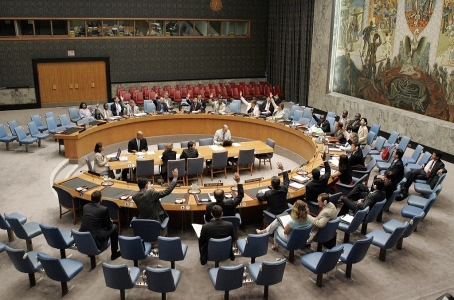
These notices alert police globally to individuals and entities who are subject to sanctions imposed by the United Nations Security Council.
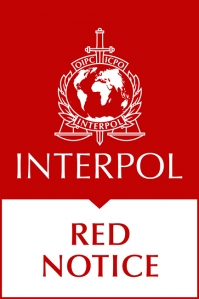
View and search public Red Notices for wanted persons
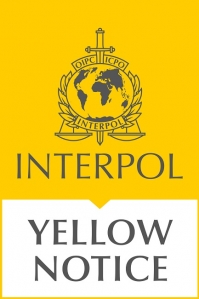
View and search public Yellow Notices for missing persons
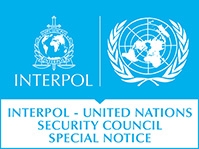
View and search notices issued for individuals who are subject to sanctions imposed by the United Nations Security Council.
View and search notices issued for entities that are subject to sanctions imposed by the United Nations Security Council.
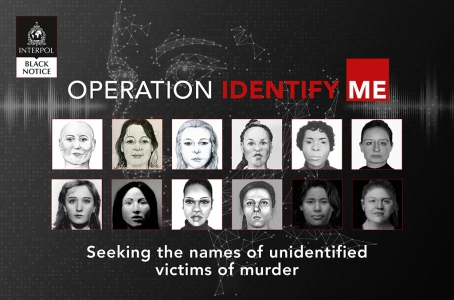
Related news
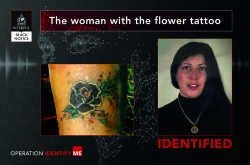
UK woman murdered in Belgium identified after international appeal
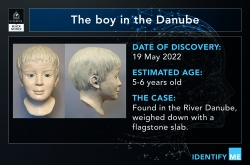
International appeal to identify dead child in Germany

14 terror suspects arrested in African operation

Multi-million euro Ponzi scheme suspect arrested following cooperation via INTERPOL
.jpg)
People smuggling sting operation: Kenya-Netherlands cooperation lands renowned fugitive in jail
Update April 12, 2024
Information for u.s. citizens in the middle east.
- Travel Advisories |
- Contact Us |
- MyTravelGov |
Find U.S. Embassies & Consulates
Travel.state.gov, congressional liaison, special issuance agency, u.s. passports, international travel, intercountry adoption, international parental child abduction, records and authentications, popular links, travel advisories, mytravelgov, stay connected, legal resources, legal information, info for u.s. law enforcement, replace or certify documents.
Share this page:
Learn about your destination
Take 90 seconds for safer travel.
Travel Advisory Levels
Enroll in step.

Subscribe to get up-to-date safety and security information and help us reach you in an emergency abroad.
Recommended Web Browsers: Microsoft Edge or Google Chrome.
External Link
You are about to leave travel.state.gov for an external website that is not maintained by the U.S. Department of State.
Links to external websites are provided as a convenience and should not be construed as an endorsement by the U.S. Department of State of the views or products contained therein. If you wish to remain on travel.state.gov, click the "cancel" message.
You are about to visit:
U.S. reissues Level 2 travel warning for Germany. Here’s what you need to know before your next trip
- Updated: May. 04, 2024, 10:10 a.m. |
- Published: May. 04, 2024, 10:00 a.m.

The U.S. State Department has reissued a Level 2 travel advisory for Germany due to fears of terrorism. AP
- Katherine Rodriguez | NJ Advance Media for NJ.com
The U.S. State Department has reissued a Level 2 travel advisory for Germany due to fears of terrorism.
The State Department issued the advisory on Wednesday, ranking the travel advisory on a scale of two out of four. This means that those traveling to an area must “exercise increased caution.”
“Terrorists may attack with little or no warning,” the State Department noted.
The agency added that terrorists could target tourism and transportation hubs, as well as shopping destinations, hotels, clubs, restaurants, local government facilities and major events.
The State Department noted on its website that for those who do decide to travel to Germany, travelers should pay attention to their surroundings , follow the instructions of local authorities, be aware of the latest breaking news in the area and adjust your plans, if necessary. The organization also urges travelers to Germany to create a contingency plan for emergency situations as well as sign up for the Smart Traveler Enrollment Program ( STEP ) to receive alerts and make it easier for the State Department to locate you in case of an emergency.
The U.S. Department of State has issued several travel warnings this year with those most recently centered around the Caribbean.
One was a Level 4 “do not travel” warning against traveling to the country of Haiti due to kidnappings and gang violence.
Another warning from the State Department cautioned travelers to “reconsider travel” to the country of Jamaica after 65 people were murdered in one month.
Our journalism needs your support. Please subscribe today to NJ.com .
Katherine Rodriguez can be reached at [email protected] . Have a tip? Tell us at nj.com/tips .
If you purchase a product or register for an account through a link on our site, we may receive compensation. By using this site, you consent to our User Agreement and agree that your clicks, interactions, and personal information may be collected, recorded, and/or stored by us and social media and other third-party partners in accordance with our Privacy Policy.
2018 Primetime Emmy & James Beard Award Winner
R&K Insider
Join our newsletter to get exclusives on where our correspondents travel, what they eat, where they stay. Free to sign up.
A History of Moscow in 13 Dishes
Featured city guides.
UK Edition Change
- UK Politics
- News Videos
- Paris 2024 Olympics
- Rugby Union
- Sport Videos
- John Rentoul
- Mary Dejevsky
- Andrew Grice
- Sean O’Grady
- Photography
- Theatre & Dance
- Culture Videos
- Fitness & Wellbeing
- Food & Drink
- Health & Families
- Royal Family
- Electric Vehicles
- Car Insurance Deals
- Lifestyle Videos
- UK Hotel Reviews
- News & Advice
- Simon Calder
- Australia & New Zealand
- South America
- C. America & Caribbean
- Middle East
- Politics Explained
- News Analysis
- Today’s Edition
- Home & Garden
- Broadband deals
- Fashion & Beauty
- Travel & Outdoors
- Sports & Fitness
- Sustainable Living
- Climate Videos
- Solar Panels
- Behind The Headlines
- On The Ground
- Decomplicated
- You Ask The Questions
- Binge Watch
- Travel Smart
- Watch on your TV
- Crosswords & Puzzles
- Most Commented
- Newsletters
- Ask Me Anything
- Virtual Events
- Betting Sites
- Online Casinos
- Wine Offers
Thank you for registering
Please refresh the page or navigate to another page on the site to be automatically logged in Please refresh your browser to be logged in
Russia rounds up migrants celebrating New Year’s Eve and enlists them to fight in Ukraine
Some 3,000 labour migrants detained in st petersburg alone as vladimir putin takes to increasingly desperate measures to make up for ukraine war losses, article bookmarked.
Find your bookmarks in your Independent Premium section, under my profile

For free real time breaking news alerts sent straight to your inbox sign up to our breaking news emails
Sign up to our free breaking news emails, thanks for signing up to the breaking news email.
Vladimir Putin took advantage of New Year’s Eve celebrations to round up suspected illegal immigrants and force them to immediately enlist in his war against Ukraine, according to multiple local media reports.
Some 3,000 migrants were detained in St Petersburg alone, as authorities patrolled the streets of Russia’s second largest city carrying out checks purportedly “to prevent crime”, reported the Kremlin’s RIA news agency.
Labour migrants from central Asia perform vital services across Russia’s economy, which is struggling amid the drain of Putin’s invasion of Ukraine and the international isolation that has come as a result.
Yet Putin has repeatedly vilified them as “not an easy problem” to be addressed, and now appears to be recruiting them to make up for the heavy losses he is suffering in Donetsk and Kharkiv .
Some of the migrants held across Russian cities were handed on-the-spot military summonses, while others were forcibly taken to military enlistment offices, reported the Moscow Times . The migrants are predominantly from central Asian nations such as Uzbekistan, Tajikistan, Kyrgyzstan and Armenia.
The authorities claimed that more than 600 of those detained were in breach of various clauses of migration legislation. More than 100 now face deportation, the report added.
A man from Tajikistan who was dressed as Santa Claus was among those held by the authorities in Moscow, reported Russian online news outlet SOTA.
The raids on Sunday night were carried out near metro stations as well as at popular gathering points for seeing in the new year, such as squares in central St Petersburg, reported news outlet Bumaga.
Russia’s top investigative organ, the Investigative Committee, said it was opening a criminal case against three migrants over “acts of hooliganism” against Russian servicemen in the west-central Russian city Chelyabinsk.
“A crowd of drunken migrants attacked two young men demobilised from the frontline, one soldier was hit with a baton,” the committee said on their official Telegram channel. The reports cannot be independently verified, with Russian media closely controlled by the Kremlin.
In a recent address Putin said Russia has more than 10 million labour migrants. The Russian government has taken increasingly desperate measures to expand its armed forces amid the losses it has suffered in Ukraine, including extending the age limit for compulsory military service.
Last month, Putin signed a decree to increase the maximum size of his armed forces by 170,000 personnel, to 1.32 million.
Join our commenting forum
Join thought-provoking conversations, follow other Independent readers and see their replies
Subscribe to Independent Premium to bookmark this article
Want to bookmark your favourite articles and stories to read or reference later? Start your Independent Premium subscription today.
New to The Independent?
Or if you would prefer:
Want an ad-free experience?
Hi {{indy.fullName}}
- My Independent Premium
- Account details
- Help centre
- Online Store
- Join Membership
- Join LFCTV GO
- MATCH HOSPITALITY
- STADIUM TOURS
- MEETING & EVENTS

- / 274635 spartak moscow v liverpool notice to travelling supporters

NEXT ARTICLE Newcastle United v Liverpool: Ticket selling details
Spartak moscow v liverpool: notice to travelling supporters.
Liverpool FC have made the following announcement to supporters regarding the Champions League away game against Spartak Moscow, to be played Tuesday September 26 at 7.45pm BST.
All supporters who registered their intent to travel to Moscow for this fixture will be eligible to apply for a ticket.
We expect to receive an allocation of 1,145 tickets for the game, which will be available online only. Full selling details, including sale dates, will be announced here shortly.
NEW FOR THIS SEASON
Following UEFA guidelines, supporters MUST provide the following information for EACH INDIVIDUAL SUPPORTER ATTENDING . If someone else is travelling using your season ticket, Members card or fan card, their details must be provided when making the booking.
We will not be able to make any changes to the booking once the purchase is complete.
Please have these details ready prior to making your booking to ensure there is no delay in purchasing your tickets:
- Full address
- Country of birth
- Date of birth (dd/mm/yyyy)
- Passport number or National Identity Number
- Outbound travel date (dd/mm/yyyy)
- Return travel date (dd/mm/yyyy)
- Method of travel to and from destination and stadium
- Name and address of accommodation
There will be no official travel package option for European away games this season, unless otherwise advertised.
- Champions League
- Spartak Moscow
Jürgen Klopp tentang hasil pertandingan Fulham 2-2 Liverpool
Jürgen klopp tentang cedera thiago alcantara dan opsi lini tengah, gallery: 36 photos from liverpool's monday workout as fabinho returns, reds send support to david brooks and dan barden, matt beard reaction | ‘it was another good win and clean sheet for us’.

IMAGES
VIDEO
COMMENTS
A Red Notice is a request to law enforcement worldwide to locate and provisionally arrest a person pending extradition, surrender, or similar legal action. It is based on an arrest warrant or court order issued by the judicial authorities in the requesting country. Member countries apply their own laws in deciding whether to arrest a person.
The issuance of a Red Notice therefore makes international travel almost impossible for the individual concerned. As of February 2024, there were 6,815 public Red Notices available to see online. Before issuing a Red Notice, INTERPOL's Notices and Diffusions Task Force must review the request.
Help us find…. How you can help find a fugitive or missing person. Wanted persons often travel to another country to try to evade justice. When requested by a member country, we can publish a Red Notice to alert police worldwide to a wanted fugitive. Missing persons can also travel abroad, either voluntarily or involuntary such as in a ...
If I am subject to a Red Notice / Diffusion, can I travel? If there is a Red Notice or Diffusion against you, there is a risk that you will be arrested, both at home and when travelling. In many countries, border agents are required to arrest people who are subject to a Red Notice, so you could, for example, be arrested on arrival or departure ...
Red Notice subjects have experienced all kinds of responses to an INTERPOL hit arising during their travels: some have been detained, arrested, and jailed pending further court proceedings. The question of whether to travel while wanted internationally really comes down to the level of risk that is acceptable to the wanted person.
WASHINGTON - U.S. Immigration and Customs Enforcement (ICE) today announced new agency-wide guidance about the use of Red Notices and Wanted Person Diffusions, as part of its commitment to comply with the requirements of INTERPOL's Constitution and Rules on the Processing of Data. ICE Directive 15006.1 codifies and strengthens the agency ...
Many Red Notice subjects are concerned about whether they may face issues when traveling, even after their Red Notices have been removed from INTERPOL databases. In some instances, although they are permitted to enter a country after a Red Notice has been removed, subjects have encountered issues at airports and either face delays or are denied permission to travel.
Our Red Notice is an international wanted persons notice, but it is up to each country to decide what legal status they give it, and whether or not to arrest the subject of the notice. ... Our database of stolen and lost travel documents is searched 3 billion times a year. True False. True.
INTERPOL Red Notices and travel to the U.S.- deciding when and whether to apply for a Redress Control Number. In our last post, we discussed the issue of former Red Notice subjects facing difficulty upon entry to the United States, even though their Red Notices had been removed. Today's focus is on whether to apply for one and when to do so.
View and search public Red Notices for wanted persons. A Red Notice is a request to law enforcement worldwide to locate and provisionally arrest a person pending extradition, surrender, or similar legal action. A Red Notice is not an international arrest warrant. The individuals are wanted by the requesting member country, or international ...
Many Red Notice subjects are concerned about whether they may face issues when traveling, even after their Red Notices have been removed from INTERPOL databases. In some instances,...
An Interpol notice is an international alert circulated by Interpol to communicate information about crimes, criminals, and threats by police in a member state (or an authorised international entity) to their counterparts around the world. The information disseminated via notices concerns individuals wanted for serious crimes, missing persons ...
CDC uses Travel Health Notices (THNs) to inform travelers about global health risks during outbreaks, special events or gatherings, and natural disasters, and to provide advice about protective actions travelers can take to prevent infection or adverse health effects. A THN can be posted for: 1) a disease outbreak (higher number of expected ...
A primary concern for clients who seek to remove Red Notices from INTERPOL's databases is what happens after they succeed in their efforts. There are many purposes for seeking the removal of a Red Notice, but a main focus for most clients is to be able to travel more easily and without the concern that they could be detained.
Red Notices are published by INTERPOL at the request of a member country, and must comply with INTERPOL's Constitution and Rules. A Red Notice is not an international arrest warrant. A Red Notice is an international wanted persons n otice, but it is n ot an arrest warran. Criminals can ee to another country to try to evade justice. A Red ...
Red Notice. To seek the location and arrest of wanted persons wanted for prosecution or to serve a sentence. INTERPOL Wanted. Help us locate fugitives wanted for environmental crimes. Learn more. INTERPOL Notices are international requests for cooperation or alerts allowing police in member countries to share critical crime-related information.
× External Link. You are about to leave travel.state.gov for an external website that is not maintained by the U.S. Department of State. Links to external websites are provided as a convenience and should not be construed as an endorsement by the U.S. Department of State of the views or products contained therein.
The Red Line is next to go through closures as part of the MBTA's Track Improvement Plan, and the transit agency is telling riders to plan for extra travel time for several weeks in May ...
The U.S. State Department has reissued a Level 2 travel advisory for Germany due to fears of terrorism. The State Department issued the advisory on Wednesday, ranking the travel advisory on a ...
1: Off-kilter genius at Delicatessen: Brain pâté with kefir butter and young radishes served mezze-style, and the caviar and tartare pizza. Head for Food City. You might think that calling Food City (Фуд Сити), an agriculture depot on the outskirts of Moscow, a "city" would be some kind of hyperbole. It is not.
Red Notice subjects have experienced all kinds of responses to an INTERPOL hit arising during their travels: some have been detained, arrested, and jailed pending further court proceedings. The question of whether to travel while wanted internationally depends upon the level of risk that is acceptable to the wanted person.
Russia rounds up migrants celebrating New Year's Eve and enlists them to fight in Ukraine. Some 3,000 labour migrants detained in St Petersburg alone as Vladimir Putin takes to increasingly ...
All supporters who registered their intent to travel to Moscow for this fixture will be eligible to apply for a ticket.. We expect to receive an allocation of 1,145 tickets for the game, which will be available online only. Full selling details, including sale dates, will be announced here shortly.. NEW FOR THIS SEASON
DK Eyewitness Travel Guides are the only guides that work equally well for inspiration, as a planning tool, a practical resource while traveling, and a keepsake following any trip. Each guide is packed with the up-to-date, reliable destination information every traveler needs, including extensive hotel and restaurant listings, themed ...
Red Notice subjects have experienced all manner of responses to an INTERPOL hit arising during their travels: some have been ordered back onto the plane and back to their departure countries; some have been briefly questioned; some have been detained and released on bond; and some have been detained, arrested, and jailed pending further court ...